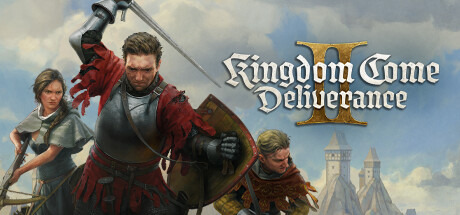
Tom and Luke are at the Rudolfinum, soaking in the magic of the KCD2 soundtrack recording with a massive orchestra and choir. Get ready for something truly special.
[previewyoutube=5oY54V7u_r4;full][/previewyoutube]
Music to Your Ears
In 2018, Kingdom Come: Deliverance’s celebrated score played a crucial role in supporting Warhorse’s unique vision for immersive RPG gaming. Composer Jan Valta returns for the sequel with an expanded, handcrafted score that delicately blends authenticity with the tastes of a modern world.
This gentle approach matters. The medieval music of Henry’s world was dominated by the spoken word, with the instruments assuming more of a background role. Time signatures ebbed and flowed with far more fluidity than modern mainstream ears are accustomed to - a story-focused form of jazz, if you like.
“It didn’t always go in four beats or four bars, and then another four bars,” Jan explains. “In medieval times the music was led by the lyrics. It was led by the text which was usually sacred. It came from God, or from the Apostles, or from Jesus. The music was tamed by the lyrics.”
Jan instead prefers to view his final touches of authenticity as “seasoning”, designed to elevate a more traditionally structured soundtrack. The score exists first and foremost to serve the narrative beats that drive Henry’s adventure forwards, in other words, rather than authenticity for authenticity’s sake.
“Daniel Vávra [creative director] and I quickly came to a common ground, which was a symphonic soundtrack: film-like music, which is then spiced or seasoned with medieval times,” he says.
“The first thing that will come to everyone’s mind is to add medieval instruments. We do this of course, and you can find ancient flutes, lutes and other instruments that you might expect to hear in a medieval town or pub!
“That’s the cherry on the top though. The important thing is how you treat the voices in the orchestra, how you work with the harmony and the chords.”
There are two distinct sides to KCD 2’s soundtrack. First, there are the symphonic compositions that support the game’s scripted cutscenes. These make up around a third of the sequel’s ten-plus hours of newly-composed music.
The process of creating each of these scores begins with so-called “spotting” sessions. As in the world of movie-making, these sessions provide an opportunity for composers and other members of the creative team to come together and discuss the dramatic beats and imagery that require musical support.
“We went through all the cutscenes repeatedly, where I would ask questions and they would tell me the details and motivations involved. You need to know the background and the context,” explains Jan. “Then we’d have what you might call a hearing session, where I present the things that I’ve composed and put together with the cutscenes.”
From here, the soundtrack moves into full production where the final arrangements are recorded with an expansive cast of live performers.
“We’ve recorded these live with an orchestra and a huge choir,” says an excited Jan. “Sometimes even in a big hall like the Rudolfinum in Prague with over 100 musicians on stage. That was a wonderful experience!”
Beyond the tightly scripted, cinematic score there’s also the second, more open-ended kind of music that provides additional background colour to every player’s unique journey. This kind of dynamic scoring demands careful use of contextual triggers to ensure the correct dramatic touch is applied to every moment in question.
“We went through all the quests with all the designers. And I really mean all of them! Not just the main quest, but also side quests, random events and so on,” says Jan.
“Wherever the quest or an event needs a musical trigger, there’s a unique trigger for it. Some quests don’t need them because the open world has its own logic - the music has its own rules on how to behave and react, including weather, the time of day and other factors.
“There are hundreds of these triggers though. If it starts to rain, we have music for rain. If you enter a dark forest, there’s special music for this. If you go to Kuttenberg, we have different music for Kuttenberg at night, because the nature of night in a city or a town is very different to the day.”
This attention to detail runs throughout Warhorse’s philosophy for building a sequel worthy of Henry’s original, much-loved tale. You’re invited to join us in this unmistakable world when Kingdom Come: Deliverance 2 releases on 4th February 2025.
Kingdom Come: Deliverance II releases on 4 February 2025 on PC, Xbox Series X|S and PlayStation 5.
https://store.steampowered.com/app/1771300/Kingdom_Come_Deliverance_II/
